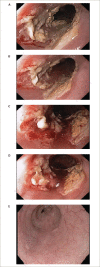Clopidogrel-induced Pill Oesophagitis
- PMID: 36277663
- PMCID: PMC9524597
- DOI: 10.17925/HI.2020.14.1.56
Clopidogrel-induced Pill Oesophagitis
Abstract
Antiplatelet agents are routinely given to prevent thrombosis of coronary stents. Often this occurs during or immediately after the procedure, while the patient is still on the catheterisation laboratory table. Ingestion of pills while supine sometimes causes mild dysphagia and discomfort but, rarely, it can cause a more severe complication. We report a case of clopidogrel ingested during PCI, which caused chest pain and pill oesophagitis after the procedure. Conservative treatment was effective, symptoms resolved, and follow-up endoscopy showed resolution of the oesophageal inflammation.
Keywords: Oesophagitis; clopidogrel; coronary stenting.
© Touch Medical Media 2020.
Conflict of interest statement
Disclosures: James C Blankenship and Matthew J Shellenberger have no financial or non-financial relationships or activities to declare in relation to this article.
Figures



References
-
- Levine GL, Bates ER, Blankenship JC. et al. 2011 ACCF/AHA/SCAI Guideline for Percutaneous Coronary Intervention: a report of the American College of Cardiology Foundation/American Heart Association Task Force on Practice Guidelines and the Society for Cardiovascular Angiography and Interventions. Circulation. 2011;124:e574–651. - PubMed
-
- Zografos GN, Georgiadou D, Thomas D. et al. Drug-induced esophagitis. Dis Esophagus. 2009;22:633–7. - PubMed
-
- Pusztaszeri MP, Genta RM, Cryer BL. Drug-induced injury in the gastrointestinal tract: clinical and pathologic considerations. Nat Clin Pract Gastroenterol Hepatol. 2007;4:442–53. - PubMed
-
- Sugimoto M, Uotani T, Nishino M. et al. Antiplatelet drugs are a risk factor for esophageal mucosal injury. Digestion. 2013;87:281–9. - PubMed
Publication types
LinkOut - more resources
Full Text Sources
Miscellaneous
